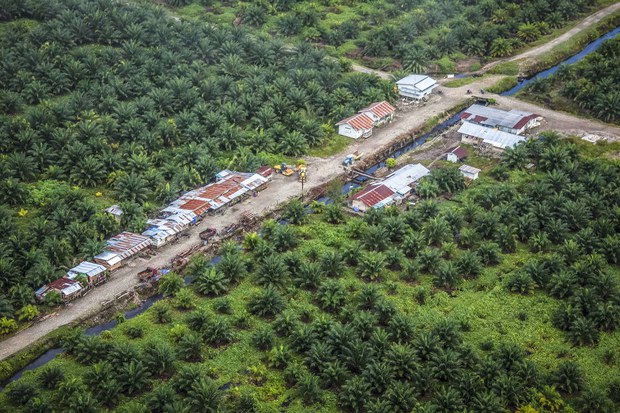Indonesia Imposes 3-Year Ban on New Palm Oil Plantations
2018.09.21
Jakarta
 An aerial photo shows palm oil plantations in Tembagapura Village in Papua province, Indonesia, Dec. 18, 2017.
An aerial photo shows palm oil plantations in Tembagapura Village in Papua province, Indonesia, Dec. 18, 2017.
The Indonesian government imposed a three-year moratorium on new palm oil plantations, an official said Friday, amid charges by environmentalists that companies supplying some of the world’s biggest brands are responsible for forest destruction.
President Joko “Jokowi” Widodo on Wednesday issued an executive order establishing the moratorium and calling for a review of existing plantation permits, according to Prabianto Mukti Wibowo, deputy for natural resource management at the Coordinating Ministry for the Economy.
“Governors and regents are ordered to re-evaluate permits and delay the opening of palm oil plantations to reduce conflicts,” Prabianto said.
The order is aimed at improving the sustainability of palm oil plantations and protecting the environment, he said.
Jokowi took action after Greenpeace on Wednesday said 25 palm oil groups destroyed 130,000 hectares (321,000 acres) of Indonesian rainforest since 2015, about 40 percent of which was in the eastern province of Papua. The environmental group said the area destroyed was almost twice the size of Singapore.
Twenty of the palm oil groups supply 12 global brands including Unilever, Nestle and Colgate-Palmolive, according to the report, “Final countdown: Now or never to reform the palm oil industry.”
It documented what Greenpeace said was “evidence of exploitation and social conflicts, illegal deforestation, development without permits, plantation development in areas zoned for protection and forest fires linked to land clearance.”
Greenpeace said the destruction has halved the Bornean orangutan population in just 16 years. The World Wildlife Fund estimates that there are now about 104,700 Bornean orangutans in the wild.
The government hopes the temporary ban will improve productivity of small plantation holders and help clarify land ownership, Prabianto said.
Request for 25 years
Indonesian environmental group Walhi welcomed the moratorium, but called on the government to extend it to 25 years to allow for reforestration.
“Walhi is calling for legal action to be taken against big corporations for their violations,” director Nur Hidayati said.
She also said the government must have enough manpower to ensure that the moratorium is enforced, saying that there was a gap in its monitoring capability.
Palm oil plantations in Indonesia covered an area of 22 million hectares (54 million acres) as of 2017, a sharp rise from 16 million hectares (39.5 million acres) the previous year.
The chief of the Association of Indonesian Palm Oil Producers (GAPKI), Joko Suriyono said he hoped that the moratorium would end regulatory overlaps that have hurt businesses.
“With this decree, all parties should sit together to solve the lingering problems,” he said.







